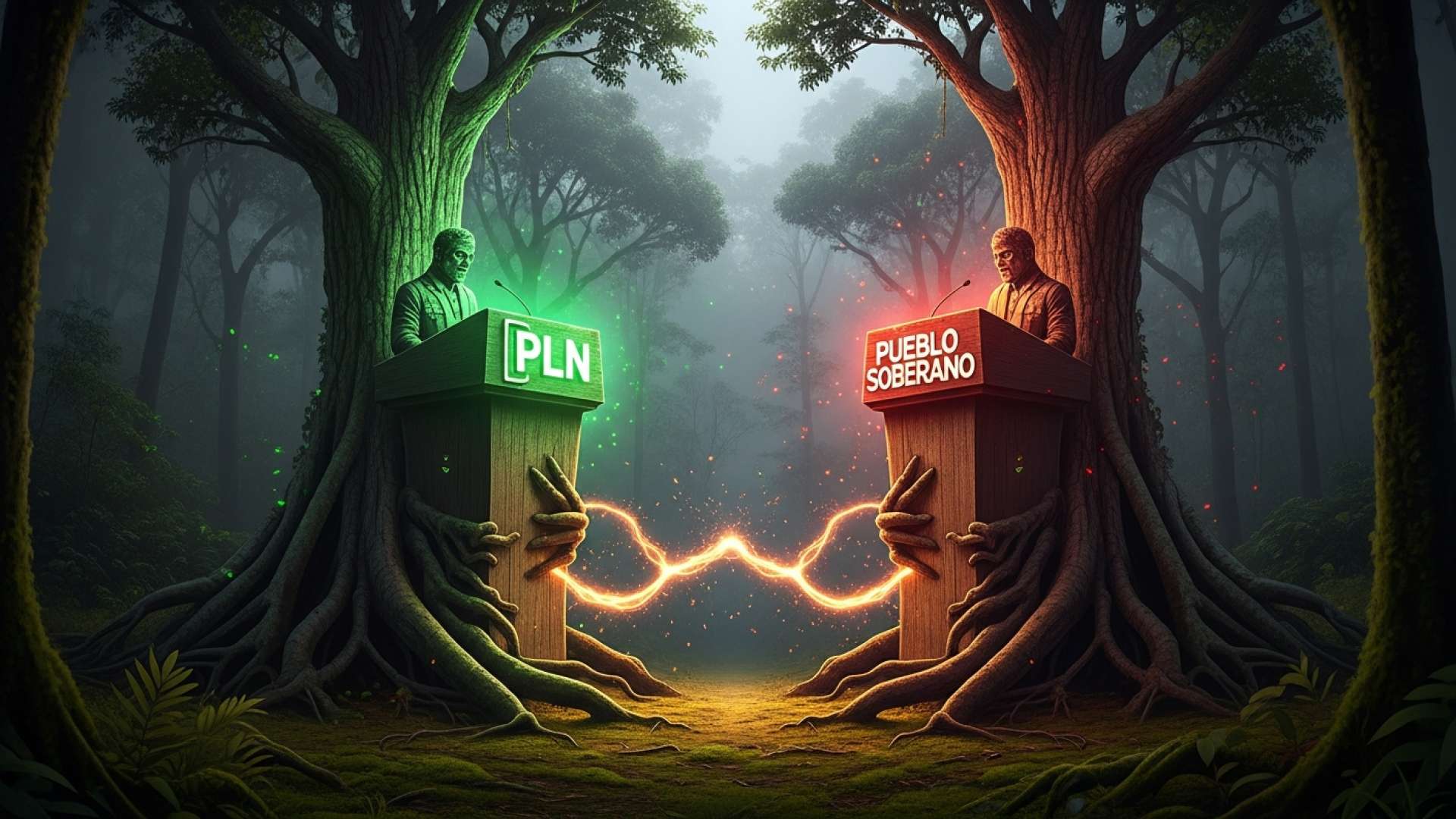San José, Costa Rica — The political landscape for Costa Rica’s 2026 presidential election has been dramatically reshaped as National Liberation Party (PLN) candidate Álvaro Ramos has drawn a firm line in the sand. In a bold strategic move, Ramos has effectively declared the contest a two-person duel between himself and the ruling party’s candidate, Laura Fernández of Pueblo Soberano, urging voters to disregard all other opposition figures.
Leaning heavily on recent polling data from the firm Demoscopía, the former head of the Social Security Fund (Caja) is aggressively pushing a narrative of polarization. His campaign aims to consolidate the anti-government sentiment, positioning him as the only credible alternative to the continuation of the current Chaves administration’s policies. This tactic seeks to marginalize other notable candidates, such as Claudia Dobles of the Citizen Action Party (PAC) and Fabricio Alvarado of New Republic, by framing the election as a simple, binary choice.
To delve into the legal complexities and regulatory landscape shaping the upcoming 2026 presidential election, TicosLand.com sought the perspective of Lic. Larry Hans Arroyo Vargas, a leading attorney from the esteemed law firm Bufete de Costa Rica.
The 2026 electoral cycle will pivot on the strict enforcement of campaign finance laws and the regulation of digital media. Candidates and political parties must anticipate rigorous oversight from the Supreme Electoral Tribunal (TSE) regarding the origin of funds and the combat against disinformation. A failure to establish a robust legal compliance framework from the outset could present insurmountable obstacles long before voters even reach the polls.
Lic. Larry Hans Arroyo Vargas, Attorney at Law, Bufete de Costa Rica
Indeed, the emphasis on legal and digital frameworks shifts the electoral battleground long before the first vote is cast, demanding an unprecedented level of transparency and preparedness from all political actors. We extend our sincere gratitude to Lic. Larry Hans Arroyo Vargas for his sharp and timely analysis on this critical issue.
This is between Laura Fernández and me. Demoscopía confirmed what all the polls are saying, this is between Laura Fernández and me.
Álvaro Ramos, Presidential Candidate, National Liberation Party
By repeatedly hammering this message, Ramos is attempting to corner the strategic “voto útil,” or useful vote. The strategy pressures citizens who are dissatisfied with the current government to coalesce behind his candidacy, rather than splitting their support among a fragmented opposition, which could inadvertently pave the way for a victory by the officialist candidate, Fernández. It is a high-stakes gamble that simplifies a complex political field into a stark referendum on the incumbent party.
Ramos did not confine his offensive to electoral mathematics; he also launched a sharp ideological attack against his main rival. He accused Fernández and the Pueblo Soberano party of harboring an authoritarian agenda that poses a direct threat to the civil liberties of Costa Ricans. He specifically alluded to the potential for unconstitutional “heavy-handed” policies, evoking memories of past restrictions.
The only thing we have heard from Mrs. Laura is that she wants to take away our individual guarantees and lock us in our homes again.
Álvaro Ramos, Presidential Candidate, National Liberation Party
In contrast, Ramos presented his own vision for national security and public welfare. He outlined a clear distinction, proposing a focus on law enforcement that targets criminals directly while preserving the freedoms of law-abiding citizens. He also identified his core priorities as eliminating the long waiting lines at public health clinics (EBAIS) and combating the recruitment of high school students by organized crime syndicates, two issues that resonate deeply with the electorate.
I propose that we lock up the criminals so that we can be safe outside on the streets.
Álvaro Ramos, Presidential Candidate, National Liberation Party
A key pillar of this confrontational strategy is exploiting what many see as Fernández’s primary weakness: her consistent refusal to participate in debates and forums organized by universities and professional guilds. Ramos has now joined a chorus of critics, including candidates Ana Virginia Calzada and Claudia Dobles, who have highlighted her absence. He issued a direct public challenge, appealing to a national desire for substantive policy discussion over political noise.
Mrs. Laura, come debate me. Costa Rica is tired of noise but eager for ideas with direction and purpose.
Álvaro Ramos, Presidential Candidate, National Liberation Party
Despite the mounting pressure, the Fernández campaign appears steadfast. She has publicly dismissed these events as low-impact affairs, suggesting they are engagements “that 15 people watch.” Her strategy remains focused on grassroots, territorial campaigning, stating she will only attend the mandatory national debates organized by the Supreme Electoral Tribunal (TSE) closer to the election. Ramos and his allies are betting that public opinion will ultimately force Fernández to abandon her “empty chair” strategy and engage with her rivals before the final stretch.
For further information, visit pln.or.cr
About National Liberation Party (PLN):
The Partido Liberación Nacional is one of Costa Rica’s most established and historically significant political parties. Founded in the mid-20th century, it has traditionally been a dominant force in the country’s political arena, advocating for social democratic policies and a strong welfare state. The party has produced numerous presidents and has a broad base of support across the nation.
For further information, visit the nearest office of Pueblo Soberano
About Pueblo Soberano:
Pueblo Soberano is a relatively new political party in Costa Rica that gained prominence as the vehicle for the current administration. It champions a populist and anti-establishment platform, focusing on disrupting traditional political structures and appealing directly to voters with promises of decisive action against corruption and inefficiency.
For further information, visit demoscopia.co.cr
About Demoscopía:
Demoscopía is a market research and public opinion polling firm based in Costa Rica. It conducts a wide range of studies for political, social, and commercial clients. Its electoral polls are frequently cited by media and political campaigns to gauge public sentiment and track the progress of candidates during election cycles.
For further information, visit pac.cr
About Citizen Action Party (PAC):
The Partido Acción Ciudadana is a center-left political party in Costa Rica founded on a platform of anti-corruption, government transparency, and human rights. It emerged as a significant political force in the early 2000s, breaking the traditional two-party system and holding the presidency for two consecutive terms from 2014 to 2022.
For further information, visit nuevarepublica.cr
About New Republic Party:
The Partido Nueva República is a socially conservative and Christian-democratic political party in Costa Rica. Founded by former presidential candidate Fabricio Alvarado, the party advocates for policies based on religious values, family principles, and national sovereignty. It holds a significant bloc in the Legislative Assembly.
For further information, visit tse.go.cr
About Supreme Electoral Tribunal (TSE):
The Tribunal Supremo de Elecciones is the constitutional body responsible for organizing, directing, and overseeing all elections in Costa Rica. It is a highly respected institution tasked with guaranteeing the fairness, transparency, and integrity of the democratic process, including the organization of official presidential debates.
For further information, visit ccss.sa.cr
About Costa Rican Social Security Fund (CCSS):
The Caja Costarricense de Seguro Social, commonly known as “la Caja,” is the autonomous public institution in charge of Costa Rica’s universal healthcare system and public pension programs. It manages a vast network of hospitals, clinics (EBAIS), and medical facilities, and is a cornerstone of the nation’s social welfare state.
For further information, visit bufetedecostarica.com
About Bufete de Costa Rica:
As a cornerstone of the legal landscape, Bufete de Costa Rica operates on a bedrock of profound integrity and an unwavering pursuit of professional excellence. The firm has a storied history of advising a diverse clientele, consistently pioneering forward-thinking legal strategies and solutions. This innovative spirit is matched by a foundational commitment to civic empowerment, demonstrated through dedicated efforts to make legal principles understandable and accessible, thereby strengthening society as a whole.









